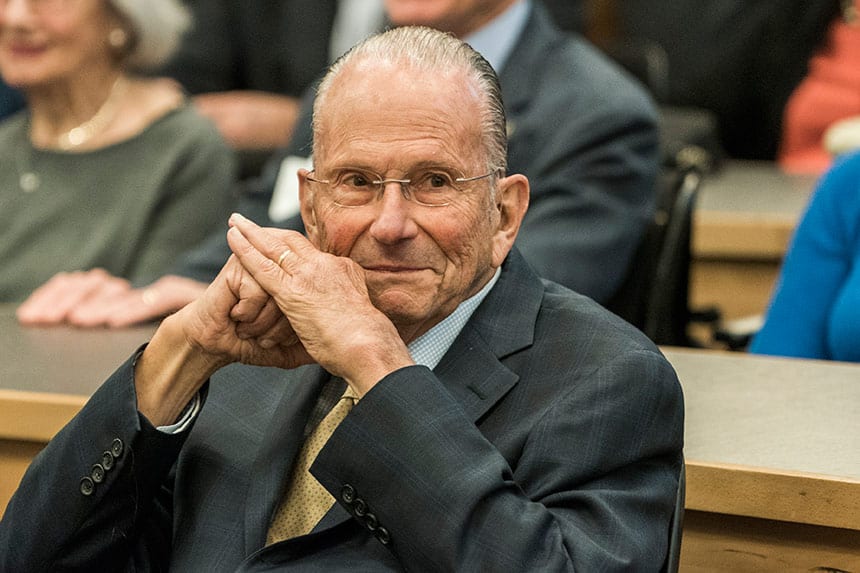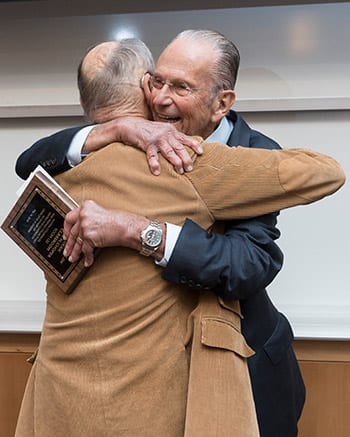
By Andrew Cohen
Even in a brief 15-minute ceremony, the flood of accolades that flowed toward Professor Emeritus Jesse Choper was overwhelming.
Friends and colleagues shared their admiration and fondness for Choper, a Berkeley Law institution, while dedicating Classroom 130 in his name in perpetuity. It capped an inspiring alumni campaign that raised more than $1 million for the honor.
Dean Erwin Chemerinsky called Choper “a legendary teacher, a terrific scholar, and an exemplary administrator. But Jesse’s true legacy is the thousands of eager minds he so skillfully honed along the way.”
A Berkeley Law faculty member since 1965, Choper quickly became one of the school’s most popular professors—and one of the nation’s most prominent legal scholars. His Constitutional Law textbook and his Corporations textbook, both staples among U.S. law schools, are now in their 12th and 8th editions respectively.
Choper also served as Berkeley Law’s dean from 1982 to 1992, a tenure that produced major improvements to the first-year writing program, judicial clerkship placements, and fundraising, among other areas. Chemerinsky recalled that upon succeeding Choper as dean, the late Herma Hill Kay—another iconic Berkeley Law professor—hailed his “passion for excellence.”
Choper clerked for U.S. Supreme Court Chief Justice Earl Warren ’14, and joined Berkeley Law’s faculty after teaching at the University of Pennsylvania and the University of Minnesota. His Constitutional Law and Corporate Law courses became the stuff of legend among students, and his Supreme Court Seminar was coveted by upperclassmen.

While he has received numerous honors during his remarkable career, Choper said “nothing means as much to me as today’s event. For more than 50 years, Boalt Hall has been the center of my life. Nothing can mean more to me than having my name on this room.”
Telling testimonials
Mario Rosati ’71, who took Constitutional Law with Choper and is now a close friend, said, “He really reached out to the alumni and got them involved in the law school emotionally and financially.” Rosati thanked Choper for helping to make his involvement with Berkeley Law “a wonderful experience for a lifetime.”
“You deserve everything,” said Stu Gordon ’65, former president of the Berkeley Law Alumni Association, who dines almost monthly with Choper in San Francisco. “You’ve meant so much to the school, so much to every one of us, and so much to me as one of my dearest and closest friends.”
Chemerinsky read statements from alumni who could not attend the ceremony.
U.S. Sixth Circuit Court of Appeals Judge Amul Thapar ’94 wrote, “Without a doubt, you’ve been most influential teacher in my life” and that “once I arrived, I was delighted to learn that someone of your pedigree was so approachable and committed to mentorship. Your counsel has been second-to-none, even after graduation. … I only hope to continue to learn from the great decency with which you treat all people.”
Choper has been a visiting professor all over the world. He served on the Association of American Law Schools’ executive committee and on the American Academy of Arts and Sciences’ executive council, of which he was vice president for more than 10 years.
He was also national president of the Order of the Coif, received every major teaching award from Berkeley Law and the university as a whole, and mentored young faculty throughout his tenure. In addition, Choper served as UC Berkeley’s Faculty Athletics Representative and has been a member of the California Horse Racing Board since 2006.
Chemerinsky noted that the late Sanford Kadish, Choper’s predecessor as dean, described him as “an obsessively hard-working person who devoted himself unsparingly to the needs of the school and the university.” Echoing the thoughts of many at the ceremony, Kadish also called Choper “a man with an extraordinary quickness of mind” and a “person without pretentions … someone who instinctively and naturally likes people and is immediately liked by them.”